#aberrant paradox
Explore tagged Tumblr posts
Text
Why did I spend an entire hour making this…..
#umm ig happy birthday to wiz !!#wizard101#merle ambrose#polaris#storm titan#Dasein#Nick Jonas#bat w101#zaltanna the mirrormask#w101 nana#lady of the lake#divine paradox#aberrant paradox#judge veg#quake charmer#dyvim whitehart#w101#wiz101#w101 fandom#wizard101 fandom#wizzy fandom#w101 art#IS THIS ART???
114 notes
·
View notes
Text
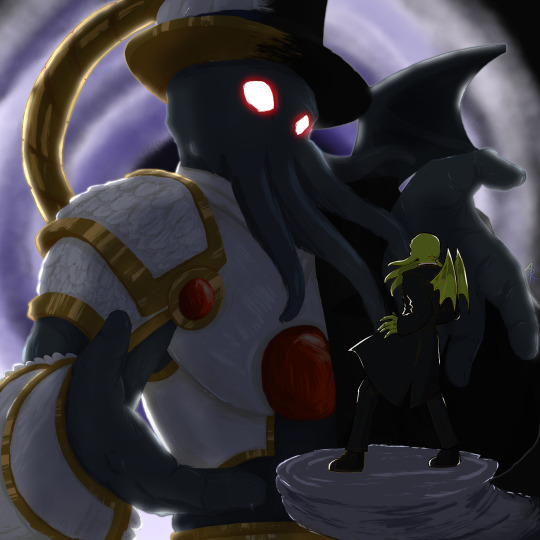
or am I indelibly stained by what I have done?
#wizard101#wizard101 fandom#w101#w101 fandom#dasein#the old one#karamelle spoilers#sal art#i know the aberrant paradox's outfit was more of a tan/off white but i couldnt be assed#i was already testing the limits of my patience and sanity working in lineless#i HATE lineless but it was necessary for the Vibe#and it did turn out good tbf#like kinda crazy good idk how i did that. wild#old one being in a cel style to indicate hes the outsider here.....idk im thinking thoughts#i love using drawing styles to convey meaning#zoom in for details if u want some of them got a little lost when i started shading
240 notes
·
View notes
Text
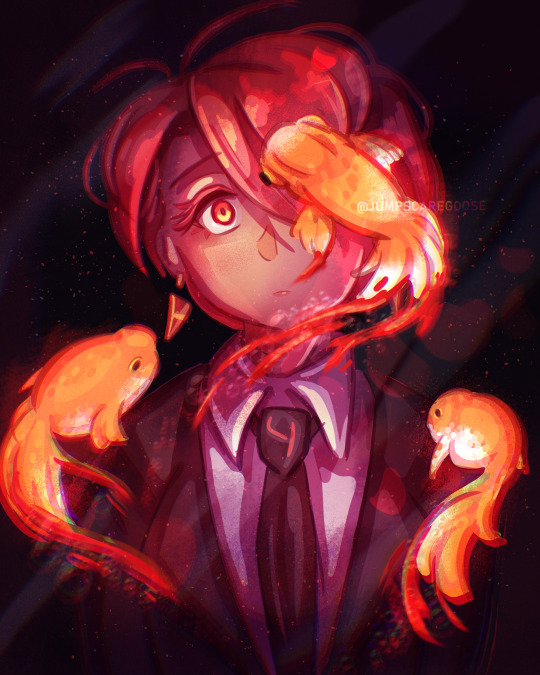
first attempt at clip studio
#paradox live#paralive#reo maruyama#goose draws#still figuring out my tablet pen calibration... haven't gotten the hang of faces with it yet#this literally only looks good because I can now abuse such luxuries as custom brushes and chromatic aberration#side note holy SHIT does my new monitor display colours differently than my tablet. bbg is SATURATED
31 notes
·
View notes
Text

From the Nothing to the Dreaming
27 notes
·
View notes
Text
so you can just like tell president eden to kill himself and he'll do it huh
#fallout 3 spoilers#???????? just like that??? i thought he was gonna say gotcha and have his men attack me. what on earth#ok i replayed w the science check and this one makes so much more sense lmfao#trapping him in a logical paradox i like this one#sorry wait i just noticed “youre an abortion of science” hold on 💀 did you mean aberration or perhaps abomination.#i mean abortion is fine too i just. hm#mia.txt
3 notes
·
View notes
Text
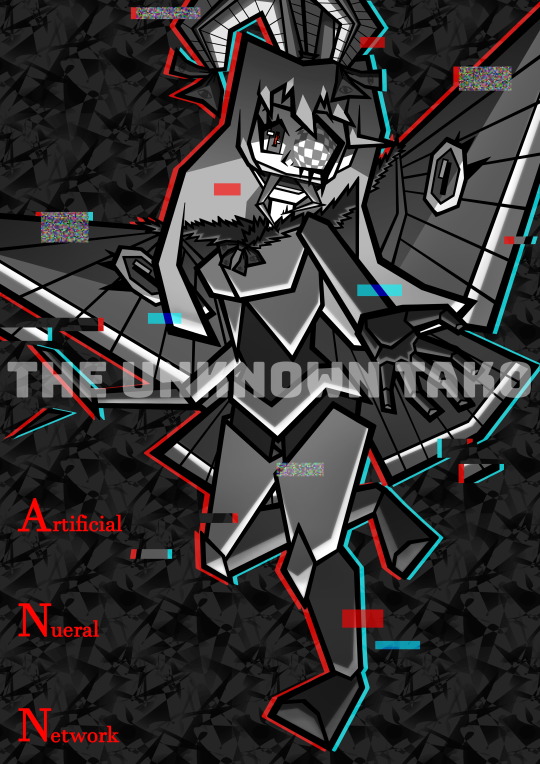
Decided to mess with some shading & special effects stuff for this one. Might post more lore on her later.
#oc#oc artwork#digital art#digital drawing#glitch aesthetic#glitchcore#artists on tumblr#black and white#chromatic aberration#project: paradox#concept art#A.N.N.#takoverse
5 notes
·
View notes
Note
Sorry if you've already mentioned it, but what are you specializing in researching as a professor? Such as how Oak studies ecology and Rowan studies both types of evolution, unless you don't need to/have a specific area you're studying?
Also, does Paldea have a new head professor after the last one disappeared? Haven't heard anything on that front for some reason.
i'm planning to specialize in the study of unique and aberrant pokemon species! effectively, i'll be studying the biology and care of pokemon like ultra beasts and paradox pokemon, though it also includes the study of some more extremist pokemon such as slugma and cryogonal. i already have experience with several paradox pokemon, and being trained in styler usage and having several certifications in pokemon care mean that i'm well-equipped to handle pokemon that are poorly understood and/or dangerous.
as for professors sada and turo...they weren't our "head professors." we don't really have a regional professor, to be honest. sada and turo were the leading specialists in terastal energy, but now that they've passed away, other specialists in pokemon bioenergy are reigniting the field.
57 notes
·
View notes
Text
Bedelia Du Maurier: A Paradox of Strength
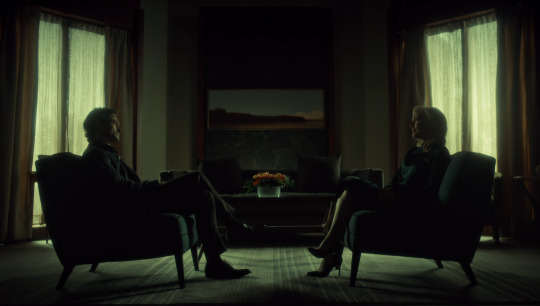
During "...And the Woman Clothed in Sun," Bedelia Du Maurier sits in the dim sanctum of her office opposite Will Graham and proffers an analogy that, at first glance, appears almost innocuous: upon encountering a wounded bird in the grass, what is his first thought? Will responds, "It's vulnerable. I want to help it." His answer is rote, reflecting the altruism he has long espoused. Situating himself in the role of a protector, he perhaps unconsciously recalls Abigail Hobbs, an orphan of violence marred in both body and mind, now reduced to a spectral presence in his psyche.
Bedelia offers a response of her own, a study in stark opposition: "My first thought is also that it's vulnerable. And yet... I want to crush it. A primal rejection of weakness which is every bit as natural as the nurturing instinct." Using this analogy, she dislocates herself from the presumed moral axis upon which Will so instinctively positions himself, aligning not with his empathy but with something more atavistic. Boasting a survivalist ethos she does not deny vulnerability—she acknowledges it, even lingering upon it, but only to render her verdict: frailty is no lamentable condition but an aberration, an intolerable defect warranting swift excision. Her words do not suggest cruelty for its own sake, nor a delight in suffering. There is no indulgence in sadism, no perverse appetite for destruction. Rather, there is a serene calculus: weakness is not to be pitied, nor even to be despised, it is simply to be eradicated. Her words, articulated with an almost reverent detachment, peel away the lacquer of performative femininity. The portrait of the genteel ingénue, helplessly adrift in Hannibal Lecter's abyssal current, is revealed as a deliberate fiction.
Beneath the veneer lies a ruthless asceticism, one that does not seek dominance, but neither will it tolerate weakness. If Hannibal wields violence as an aesthetic principle and Will wrestles with it as an existential burden, Bedelia comprehends it as a fundamental undercurrent of existence—a force to be wielded rather than suffered in resignation. To acknowledge vulnerability is not to succumb to it, and thus, she does not suffer the wounded bird’s existence; she corrects it. Will sees the bird as an object of salvation. Bedelia perceives it as a vessel of failure, unsuited to the indifferent machinations of nature. In this, she transcends both Will’s sanctity and Hannibal’s spectacle—she does not seek to heal, nor does she seek to transform. She simply removes.
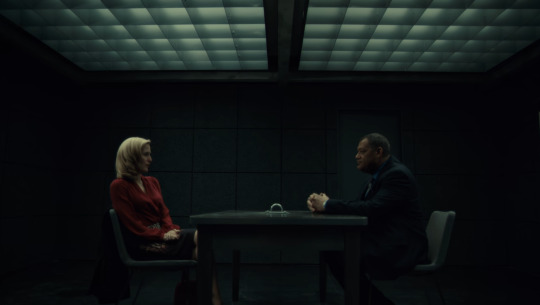
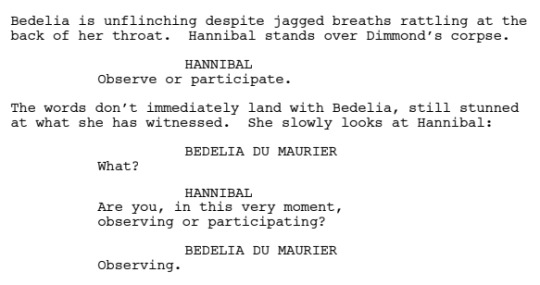
Throughout "Hannibal," Bedelia exhibits an exquisite mastery of affectation, draping herself in the diaphanous guise of disarming gentility. Her voice, a gossamer thread spun with scrupulous poise, unfurls in silken cadence; her every movement executed with a danseuse's precision. Drawn more to the status of observer, Bedelia’s performance renders her a peripheral entity whose agency appears negligible in the grand orchestration of violence that encircles her. Just as Hannibal understands the power of aestheticism, sculpting flesh into grotesque sublimity, Bedelia transmutes vulnerability into an instrument of preservation. Inhabitancy within Hannibal's orbit does not demand overt defiance; it necessitates something far more perilous—a performance so sublimely wrought that even he cannot discern where artifice ends and truth begins.
In divulging her thoughts regarding the wounded bird, she fractures the porcelain of her composure. What begins as confession blossoms into revelation: her passivity is not born of fear, nor resignation. It is, instead, control in its purest distillation. She is not merely surviving; she is curating the very conditions of her endurance. Dictating when to be seen, how to be perceived, and most crucially, when to disappear. She permits a perception of vulnerability, while harbouring an inherent disdain for those who truly are. Hers is an artistry of negation, much unlike the operatic grandeur of Hannibal’s tableaus, which demand the spectacle of suffering. As Hannibal refines the flesh, Bedelia refines herself into something elusive, an absence so deftly sculpted that it renders her untouchable.
The bird serves a purpose beyond its superficial alignment with Hannibal; it declares the futility of Will’s moral equilibrium. Neither seeking enticement or ruination as Hannibal does; instead, she renders his righteousness irrelevant. Casting doubt upon Will’s professed beneficence is not outright refutation but a deconstruction, a quiet demonstration of its impotence. His compassion, no matter how visceral, cannot alter the fundamental truth that weakness is an anomaly to be crushed or repurposed. He may reject Hannibal’s design, but he cannot escape the structure of the game. And in Bedelia’s eyes, that makes his resistance not noble, but naïve.
Additionally, her statement carries an implicit critique of Will himself. His vaunted empathy is not a fixed point of virtue but a tide, shifting ever closer toward his darker proclivities. He claims the impulse to cradle fragility, but time and again, finds himself in the company of those who reject weakness outright. His continued entanglement with Hannibal belies a deeper truth: he does not merely rescue fragility—he is seduced by that which devours it.
Thus, the wounded bird analogy does not simply serve as a glimpse into her psyche—it is a surgical exposure of the fractures within Will’s. In a world where survival is dictated by power, she does not allow herself to be sculpted. Neither savior nor supplicant, artist nor artwork. She is something else entirely.
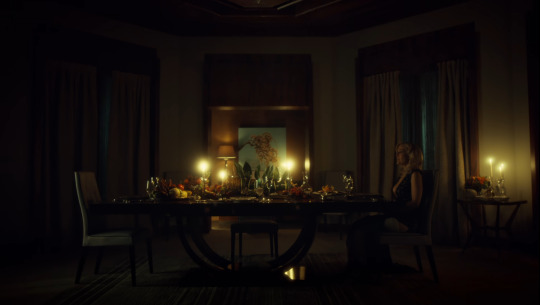
This philosophy reaches its final expression in the post-credit sequence of "The Wrath of the Lamb," where Bedelia is seated before an opulent feast of which she is both guest of honour and offering. Before her, plated with the meticulous grandeur she once delighted in, rests her own leg. A macabre indulgence composed flawlessly: flesh, silver, candlelight. An ode to excess, to the splendour of control laid bare. This is her grand reckoning, the moment in which the filigree of dominance she so carefully wove begins to fray. At a glance, it appears the consummate act of subjugation: the instant in which she is forced into the very position of vulnerability she has long abhorred.
And yet, in the face of such degradation, Bedelia remains resplendent. Once, she dismissed weakness as an intolerable aberration and now, seated before the most vile manifestation of that principle, she refuses to succumb. Neither herself nor her captors will be granted the satisfaction of seeing her yield to the pitiable role of the wounded bird. If weakness is to be expunged, then she ensures she is not its bearer. A repudiation of victimhood so potent that it defies its very terms, elevating survival to a deliberate act of artistry. The balance shifts—not in the overt violence of Hannibal’s design, nor the moral contortions of Will's reckoning, but through the refusal to collapse into their paradigms. Instead, she performs her coup de grâce: taking an oyster fork and concealing it beneath the table.
The fork, so delicate in its apparent inconsequence, becomes her final instrument. Above the crudeness of a brutish resistance, it becomes a gesture of postponement refusing to surrender to the role imposed upon her. But above all, it is a signature—her final curatorial act in a tableau not of her own making, but one she will nevertheless dictate. The fork does not pledge survival, only authorship. Even in what should be her moment of ultimate disempowerment, she commands the framing of the scene. For if her flesh is to be transfigured into art, it will bear her own inscription.
Thus, the tableau shifts. Bedelia does not capitulate to the role of the consumed—she utterly disavows it. Asserting that she is no mere offering upon Hannibal's altar of aestheticized brutality, nor an inert object of Will's existential dilemmas. For all her poise, Bedelia's ultimate fate remains an enigma. If Will and Hannibal embody the ceaseless cycle of destruction and rebirth, Bedelia represents something more elusive: survival not as triumph, but as an aesthetic philosophy. She will not be devoured into abstraction nor dissolved into another's mythos. She remains immaculate, inscrutable, and above all, unclaimed.
By its very nature, to be placed before the feast is to be rendered an object of consumption, a work sculpted by another’s hand. But Bedelia is neither passive flesh nor pliant sacrifice. Her presence, like the silverware, is deliberate, gleaming. Bedelia’s final act suggests another possibility: that to be consumed is not necessarily to be conquered. That one may be devoured and remain sovereign. If Hannibal and Will enact destruction as an art, Bedelia sculpts survival into something just as deliberate, just as orchestrated. Perhaps her final sleight of hand is not in evading predation, but in ensuring that if she is consumed, it will not be in surrender, but in defiance. She will not be broken—only curated.
The wounded bird analogy, then, is no idle musing on instinct—it is a thesis on survival, a distillation of Bedelia's self-conception. She is not weak, nor does she aspire to be. Rather, she is an artist of perception, wielding fragility as both shield and sword. Will allows himself to be undone, rewritten by Hannibal’s design. Bedelia does not. She does not fight the aestheticization of violence; she ascends beyond it. Where Hannibal refines flesh into art, she sculpts absence into authorship. Will struggles against becoming, Hannibal revels in making—but Bedelia? She dictates the terms of her own existence, even in its supposed obliteration.
51 notes
·
View notes
Text

Part Seven König / Ghost / Reader [ Previous 〡 Next ] ︱AO3 ︱Wattpad ︱ taglist (if you want to be added - let me know!): @strawberrygato, @ghostslittlegf, @eskalotte, @abcdbleh, @yawning-grave81, @liamwholover, @valira-demaur, @idek101-01, @mizu-bozu, @pinkslaystation
As the first rays of daylight gently filter into the room, you slowly awaken, your eyes fluttering open. Yet, the sheer intensity of the vibrant morning sun proves overwhelming, causing you to instinctively shield your face with your arm. It’s as if a spotlight has been directed straight at you, momentarily blinding you and making it challenging to adapt to the sudden burst of brightness.
Slowly, the sun’s rays pierce through the window, gradually filling the room with a stifling heat. As you lie under the layered blanket, you can feel the warmth seeping into the fabric. The sensation of being wrapped in the blanket is akin to being enclosed in a suffocating woolen coat during the hottest days of summer, compelling you to forcefully remove it and toss it aside. A sigh of relief escapes from your lips as you do so.
You lie there for a moment longer, allowing yourself to adjust to the temperature and bask in the comforting stillness that only the early morning hours can bring. However, this moment of peace is shattered when you blink a few more times, forcing your eyes to adjust to the light. As your gaze roams the space, drinking in the details of the unfamiliar surroundings, it eventually settles on the bed you’re laying in. More specifically, it settles on the sleeping figure. Simon. He’s laying there, right next to you. Lightly snoring, he has his back turned to you, completely undisturbed by your sudden awakening and the turmoil of emotions that have come with it.
Fragments of last night’s memories seep into your mind like tendrils of fog curling around your thoughts. You recall the moment you kissed Simon. And he kissed you back. Yet, a single kiss was not enough. It failed to quench the overwhelming desire that had been steadily accumulating over the many months. Nor did it manage to diffuse the palpable electric tension that had settled between you two, like an unspoken challenge waiting to be met. Even the heated make-out session that followed, a whirlwind of passion and urgency, did not satiate your shared need.
Like a starved man, Simon impatiently clawed at your clothes. He tugged at the fabric insistently, as if each second you remained clothed was a second wasted. He peeled away it all, leaving you bare and vulnerable before you could fully comprehend the gravity of what was happening. His hands, coarse yet gentle, began a deliberate exploration of your body. His fingers traced the contours of your curves. They dug into your flesh, as if trying to etch every inch of you to memory. In that moment, you were damned—you were aware of his intentions, and yet, you found yourself unwilling, or perhaps unable, to put a stop to it…
In a vain attempt to clear the tumultuous clutter that is your mind, you slowly close your eyes, permitting the darkness to envelop you. You draw in a long, deep breath, feeling the air fill your lungs, holding it there for three agonizingly long seconds. As you hold your breath, you feel the tick of each second, each one seeming longer than the one before. The world, with all its noise and chaos, comes to a standstill. Eventually, you allow yourself to exhale, releasing the air in a slow, controlled manner, trying to mimic the calm you so desperately seek.
You sternly tell yourself, almost commanding your mind, not to think about it. You must forget what happened; it was a mistake, a momentary lapse in judgment that you can’t afford to repeat. You try to convince yourself that it was just a moment of weakness, a one-off aberration that doesn’t mean anything. But deep inside, in the corners of your heart, you can’t help but not regret it—it’s a paradox, a silent war between your mind and heart.
Turning your head, your gaze falls on Simon. In his sleep, he rolls over, his heavy arm sneaking around your waist. With a slight tug, he pulls you closer to him. There’s a serene expression on his face, as he nuzzles his nose into the crook of your shoulder. In this quiet moment, you suddenly become aware of the fact that your clothes are discarded somewhere in the living room.
You try to extract yourself from Simon’s embrace, intending to retrieve your clothes and dress up, but he stirs in his slumber. He mumbles something unintelligible under his breath. His grip tightens around your body, drawing you back into the bed. With a sigh of resignation, you allow yourself to settle back against him. Your body naturally gravitates towards his, like two magnets drawn together. Your tension, once as rigid as a tightly strung bow, melts away under the gentle caress of his fingertips, dancing over your skin. It’s a delicate touch that sends shivers down your spine. His hand then settles on your hip. Despite the guilt and shame, that gnaws at your conscience—a lingering aftermath of your actions—you find a sense of comfort and security nestled in Simon’s embrace.
You don’t have your phone, but you’re sure it’s flooded with messages and missed calls from König. He’s likely wondering where you are, considering you left without a word. The thought that he may have spent a sleepless night worrying about you crosses your mind, sending a pang of guilt through your heart. But you try your best to push it away, choosing instead to focus on Simon, on the gentle rise and fall of his chest, and the soft rhythm of his breathing.
After another hour of waiting, Simon finally wakes up. He unwinds his arms from your waist and rolls onto his back, yawning. You stand up, pulling the blanket off the bed and wrapping it around your shoulders. Despite the room being heated more than necessary, you don’t care. A sudden wave of modesty washes over you, prompting an unexpected desire to hide yourself from his gaze. This feeling strikes you as somewhat absurd. Especially considering that after the events of yesterday, there is barely anything left to hide—he has seen it all.
You tiptoe out of the bedroom to the living room, clutching the blanket around you. A moment later, footsteps follow you. Simon leans against the doorway, his eyes fixed on you. He watches as you dress with an unreadable expression on his face. You find yourself grateful for his consideration in putting on a pair of loose sweatpants.
Despite this, you can’t help but catch glimpses of his bare chest, your eyes fixated on the way his muscles ripple with every movement. As you steal these quick, furtive glances, your cheeks flush, getting brighter and brighter each time.
“About last night...” Your voice cuts through the silence, shattering the silence like a stone through glass. You speak up since neither of you have dared to say anything yet. “Us. Together. It was a one-time thing. We can’t... we shouldn’t repeat what happened. Ever again.”
Simon makes no objections. He simply nods, accepting your words without argument. His unexpected silence takes you aback, but you don’t question it. You are afraid that further discussion might change his mind or, worse, reveal more than what you’re prepared to confront.
You even make him promise. No, it’s actually more than that. It’s a vow — an unbreakable pact that Simon will not tell a soul about how you ended up in his bed. You want him to keep this secret, to forget about it all. Your greatest fear is for König to find out: it’s not that you regret sleeping with Simon, but… but you also don’t want to lose König. It’s a selfish thought—wanting to have them both—but you decide this is a problem for another day. For now, you don’t want to be forced into making a choice. The fear of making the wrong one scares you.
* * *
As you return home, the quietness of the house engulfs you. You pull off your shoes, throwing them off to the corner. The erratic rhythm of your heart, pounding like a drum in your chest, echoes in your ears, amplifying the stillness surrounding you. You find König in the kitchen. His eyes are fixated on something outside the window. You feel a sinking feeling in your stomach. It’s a dreadful gnawing sensation that refuses to subside as you tentatively follow his gaze.
Your eyes land on the house across the street—Simon’s house. The sight of it sends a shiver down your spine that has nothing to do with the morning chill. Could König have seen you leaving? Your breath catches in your throat, a lump forming that you find difficult to swallow. You stand there, frozen, rooted to the spot, your mind buzzing with a million thoughts, a million possibilities.
But you force yourself to regain your composure, to steady your hands that have unconsciously started to tremble. After all, you hadn’t brazenly strutted out through the front door; you had been careful, meticulously so. You had snuck through Simon’s backyard, even taking a meandering route around the neighbourhood, winding through side streets and alleyways, before daring to step foot in your own home.
Your attention shifts to König’s hands. He’s fiddling with his phone, his fingers brushing over the screen absentmindedly. Even from where you’re standing, you can see your image displayed on his screen, your name and number underneath. You contemplate retreating, thinking a shower might buy you some time before you have to face him, talk with him. But just as you’re about to slip back into the shadows, he senses your presence, like a predator catching the scent of its prey.
His head swivels towards you with a jerk, his eyes widening in surprise at your sudden appearance. The phone slips from his grasp, clattering onto the countertop. His reflex response is to pull you into a steel-trap embrace, his hold so unyieldingly tight that you fear your ribs might splinter under the pressure. His hands roam over your body, running over every inch as if he’s assessing for any signs of injury. It’s an instinctive need to ensure you’re alright. Then, his palms cradle your face, gently tilting your head from one side to the other.
Eventually, König pulls away. The deep lines of worry etched in his features slowly fade away as he realises you’re unharmed. Fine, perfectly fine.
He finally breaks the silence. “Where have you been?” His voice is low, tinged with a harshness you rarely hear.
“Out.”
Clearly unsatisfied with your evasive response, he presses further. A sense of urgency creeping into his voice. “Where?” Despite his insistent questioning, you remain silent.
He launches into a barrage of inquiries, a torrent of words that batter against your defenses. Each question is met with either your silence or brief, vague responses. You’re afraid that if you say too much, you’ll trip over your own web of lies.
“... and you didn’t think you should tell me, or at least take your phone with you?” He asks.
You respond with a simple shake of your head.
As König continues to push, to probe, to accuse, you feel your patience wearing thin, slowly being eroded like a cliff under the relentless assault of the sea. The familiar heat of anger begins to simmer within you. You want to retaliate, to shout back, to let loose the torrent of words that have been building up within you. You want to confess that you had called Sarah, to accuse him of cheating, to hurl the same accusations that have been ricocheting around your skull like bullets in a steel drum. But you hold back, biting down on your tongue, the metallic taste of restraint filling your mouth. You want to prevent this argument from spiralling into a full-blown fight, from escalating into a war of words that neither of you would win.
Because, as much as you hate to admit it, you aren’t oblivious to the bitter irony of the situation — you are no different from König. You had accused him of cheating, of betraying your trust, of being the villain… Yet, here you stand, guilty of the same crime.
#simon riley x you#simon ghost riley#writing#simon riley x reader#ghost x you#ghost x reader#cod#ghost x y/n#call of duty#ghost cod#konig x reader#konig call of duty#konigxghostxreader#konig cod#ghost call of duty#cod ghost#fem!reader#ao3 fanfic
68 notes
·
View notes
Note
Hi, here Cottage Life Anon :3 I like this name a lot, but sadly I didn't find a cute Cottage emoji, so here the chosen one: 🦋
Being 🦋 Anon while been know for talking about a timetravel fic and the whole timeline mess it's involve is actually quite funny 😂
Happy to be one of your partners in crime, it's seems this timeline OT3 ending have beautiful days before it !
I'm pretty sure Dawny would be offered a job at RSA as a sword teacher. And he would also took care of a kind of fencing club in NRC :3 (Man wants to bring money at home- He was a houseman back in the time because Silver was a baby and the situation between him and the fae was still not so good so now he wants to be more active after his sleep 🥹)
I crave for Y/n schoolmate reaction 😭 The Adeuce duo + Grim are the most incredible. But everyone is priceless. "The F- Silver is your child ? He's older than you !" (In a scenario where Y/n be back at her regular age as a first year when returning in the present-)
Perhaps Lilia hid the whole truth to Silver. Like, if he was awake before the Knight, perhaps he thought it was an accident. And if Meleanor and Levan don't success to put the child back to sleep, it can add fuel to the idea. Lilia could be scared that Silver would never met his mother and other father because of a magic problem. The rest of the event would be similar to the original timeline.
Actually, timetravel and changing timeline is a trope that have many different concept, views and solution. But I kinda like the idea of a timeline "arranging/reguling itself" so the flows of event do not become too much aberrant after some big change (and it's actually a pretty simple way to avoid time paradox- 🫥). It can also explain Y/n returning. Because honestly, I think no one would willingly go back to the present (in another world-) after having a kid and living in a cute Cottage with 2 handsome and perfect husbands-
Plus Teen Silver play a essential role in original timeline. Because without him, no dream, no saving, Y/n in Malleus dream forever, no timetravel after that, no story- And I need him to meet Sebek and Malleus because sad croco boi need his training brother figure and big lonely prince need to save baby from Lilia's cooking. Meleanor and Levan have their limits-
(How that in a time where Malleus parents are alive because of the changing timeline there is no reason to explain any reguling of it because it's nonsense ? But- My Diasomnia family fluff- 🥹)
I actually have a little thing started in a text document for this OT3 🫡 I run free for it-
Thank you for initiated this OT3 😭
(References: Fanfic, Ask 1, Ask 2, Ask 3, Ask 4, Ask 5, Ask 6)
Hello 🦋 Anonie,
Wonderful choice of emoji 🦋 Anonie! I love this emoji and like you said, there is irony in using such a symbol. Namely the OT3, Time travel, and the butterfly effect 👏☺️😂 Let's go my partner in crime 💚🙌
Yes, considering all the pain and suffering the original canon timeline went. I wanted this OT3 timeline to have a happy ending for them. 💚🥰 There will still be struggles of course, but in the end, I want them to have a wonderful ending.
Dawny being more active and wanting to bring financial stability to his family is so sweet. I can see him become a teacher at RSA and mentor the students there and NRC. He doesn't want to anyone to feel left out so he sets up a club at NRC. Lilia would mention how he has more than enough money for their family, but of course, Dawny does not want to just let Lilia handle everything. And really, how can anyone say no to those determined looking eyes?
This will allow him to not only have a reason to visit both schools, but he can also spend time with his son and his classmates. I can see Silver and Sebek popping in occasionally to train with Dawny. After all, learning from two powerful warriors can only help them in the future as knights for Malleus. I can also see them being Dawny's training partner for the other students who want to learn and observe as well.
Then you also have Lilia and Dawny, I can imagine they would both have practice fights to show off to the students. YN warned them not to get hurt and not to destroy anything during their spar.
Currently timeline shenanigans with YN's schoolmates is what I love, especially for the first years. Jack is extra alert because you're a mom...or well, mom figure? And as a wolf, they take pride in protecting maternal figures. But he is also so confused because how does he treat you? You are still in his same year and age.
Then you have Epel, I can see him switch from Miss to Mrs. to Ma'am and just get frustrated. 🤣 Sebek is going through all the emotions. You’re a human who is very well loved, wife of Lord Lilia but also somehow Silver's mother and the wife of the Knight of Dawn, someone help this boy. He starts treating you with great respect, but you have to stop him and compromise with him. At school and other places, he can just treat you normally. If he's comfortable, he can be respectful back in Briar Valley. After all, you're friends with Sebek and you want it to stay that way and you dont want that to change because of some status he thinks you have now.
The "Silver is older than you" comment has me laughing.
Here are some other Twst character interactions I can think of once they found out.
Leona: Now calls you 'Lady or Princess" with that smirk on his face, trying to irritate you.
Kalim: finds this whole situation interesting. He doesn't fully understand it but as long as everyone is happy he's happy.
Jamil is now worried because he now has to worry about more people not to offend...and then he remembers what he did to you in book 4 and watch him hide in his hoodie.
Rook: loves the chaos and all the emotions around him. I can see him want to spar with both Dawny and Lilia.
Idia: is wondering how some of his favorite tropes in anime/games became real. He is also slowly trying to disappear because too many beautiful people and he doesn't want the attention.
Ortho: Well, he's having fun calculating the likelihood of this entire situation happening. In short, wow YN, you really beat the odds in everything you do.
I can imagine the pain and suffering Lilia went through to hide the truth from Silver. He loves Silver and is happy to raise him as his son, after all Silver is his son, but it hurts him that you and Dawny couldn't be there to see how your three's special boy grew up. YN and Dawny would have to step in not to only assuage this guilt and comfort him, but to do the same with Silver.
Silver would definitely need to be sat down and talk to about all this, about how loved he is and how you three are happy to see him happy and healthy.
Exactly! Who wants to return to their normal life after having such a precious family? Especially who wants to be annoyed by the headmaster constantly? So this is a win-win on all situations.
Thinking about the original timeline and how while it is the same, it is still different for all the good ways. Sebek has his best friend, Malleus got to help raise Silver and have his parents, and Silver gets extra family members who love him.
Meleanor: The spoiling aunt who will dress up her child and Silver (and later Sebek) in cute clothes, will kidnap him whenever Lilia isn't looking or Malleus tries to hide Silver from Lilia's cooking.
Levan: Who can also teach Silver and Sebek history and tactics. He can tell them stories and calm down his wife when she gets hyper.
For Diasomnia Family fluff, we can forgive and change anything to our needs 🦋 anonie 🙌
Ahhhhh I'm so happy to hear that 🦋 anonie!!! That brings me a lot of joy, that you loved this idea I had so much, that you started writing too 🥰🥹 It brings me happiness that I can inspire others to create. You have no idea. Please, if you end up finishing it, please share it with me. If you post it here on Tumblr, please tag me or send me a link if you are comfortable. Or you can always use the ask box too to share. I would love to read it 😭🥹💚
You're very welcome! This OT3 has become a comfort for me, and I am so happy to see others interested and loving it too. I love that people are joining the love for it. It brings me so much happiness, especially since it has such a close place in my heart.
Thank you as always fro sending this in 🦋anonie.
#answered#anonie ask#🌺🦋anon🌺#twst knight of dawn#twst knight of dawn x reader#twst knight of dawn x reader x lilia vanrouge#lilia vanrouge#lilia vanrouge x reader#🌺cottage life anonie🌺
158 notes
·
View notes
Text
"The idea of mothering and procreation morphed into Gorky’s fascination with prisoner transformation and perekovka. The labor camp would be the mother of a new working class. Both god-building and the maternal impulse dovetailed with the author’s largest philosophical and intellectual preoccupation: human fashioning. Whether it was the literal, biological creation of the human by the maternal womb or the transformation afforded by a personal journey or individual greatness, Gorky remained intrigued by the individual’s ability for creation, journey, and self-discovery. Maintaining that humans were inherently malleable and eternally improvable, he believed in the potential for endless refinement through diligent effort.
Gorky’s special relationship to the Belomor project allows for an understanding of his career as a symbolic representation of the ideals promoted at the camp. Gorky was a staunch enthusiast of prisoner labor and even predicted the possibility of a waterway similar to Belomor in his early works; in the April 1917 issue of his journal New Life (Novaia zhizn’) he writes
Imagine, for example, that in the interest of the development of industry, we build the Riga-Kherson canal to connect the Baltic Sea with the Black Sea […] and so instead of sending a million people to their deaths, we send a part of them to work on what is necessary for the country and its people.
Gorky’s condoning of Gulag camps such as Solovki and Belomor seems paradoxical to many scholars in light of his humanitarian endeavors, and some speculate either that Gorky was ignorant of the full extent of Stalin’s butchery or that he was aware, but was in a position that necessitated acquiescence to safeguard his well-being. When viewed in the context of his philosophical outlook on literature and labor, however, his support of prison camps seems not like an aberration but rather a natural extension of his belief in violent re-birth, a belief related to Marxist-Leninist ideology and the concept of god-building. Gorky sees people and language alike in the framework of craftsmanship. Perhaps his mistake was not so much his general support of Gulag projects, but his belief that human flesh can be formed like words on a page or cement in a factory. Gorky, after all, cared more about the craft than people themselves; in his 1928 essay “On How I Learned to Write” (O tom, kak ia uchilsia pisat’), he claimed that “the history of human labor and creation is far more interesting and meaningful than the history of mankind.” Gorky was key to the canal project because his philosophical interests exemplify the very core of Belomor: the violent transformation of people through creative acts.
Technology’s magic demonstrated humans’ usurpation of God in a tangible way, with the ever-widening capacity to harness and transform the natural environment showcasing the potential of man-made machines. Soviet pilots were imagined as literal incarnations of the New Man, and the massive expansion of the Soviet aviation industry in the mid 1920s provided some of the most concrete evidence of human superiority over the divine. Short voyages known as “air baptisms” (vozdushnye kreshcheniia) supposedly eradicated peasants’ belief in God while highlighting the majesty of Red aviation. In such “agit-flights,” pilots would take Orthodox believers into the skies and show them that they held no celestial beings. Those who participated in the flights would narrate their experiences to neighboring villagers, describing “what lies beyond the darkened clouds.” This phrase served as the title of a 1925 essay by Viktor Shklovskii in which a village elder embarks upon a conversional agit-flight that he later recounts to his fellow peasants. Six years later, Shklovskii participated in the writers’ collective that coauthored the now infamous monograph History of the Construction of the White Sea-Baltic Canal, in which a different, often deadly, type of technological program offered the promise of conversion. In both instances, darkness will be overcome by the enlightening potential of socialist rationalism: aviation will liberate the peasants from their ignorant beliefs, just as labor will supposedly bring the Belomor prisoners to the light of Soviet ideology. Such endeavors occurred before the backdrop of a larger civilizing project, since both the rural reaches of peasant villages and the wild expanses of untouched Karelia necessitated modernization.
Yet could such projects ever be completed? Did the New Man really exist, and could his creation ever be achieved? The messianic vision of Soviet socialism necessitated that paradise lie always just out of reach.
Similarly, Nietzsche posits the development into the Übermensch as a perennially elusive goal; like the Faustian concept of striving, the individual is forever trying to perfect oneself without necessarily ever achieving perfection. This constant yearning renders the present as the future, as the purpose of today is necessarily the reward of tomorrow. In the Soviet Union, the regime assured people that the difficulties they endured were required in order to reach the svetloe budushchee (radiant future), a utopia found at the end of an interminable road. In the absence of an end result or final destination, the voyage itself becomes the site of cultural exploration."
- Julie Draskoczy, Belomor: Criminality and Creativity in Stalin’s Gulag. Boston: Academic Studies Press, 2014. p 30-32
#maxim gorky#new man#belomorkanal#belomor#gulag#white sea baltic canal#Беломо́рско-Балти́йский кана́л#prison camp#work camp#soviet history#soviet union#stalinism#academic quote#reading 2024#history of crime and punishment#perekovka#russian revolution#soviet communism
42 notes
·
View notes
Text
I got the terrible idea to torture myself with some video editing on that previous video lololol BUT IT TURNED OUT SUPER CUTE
(Filegarden link here to the 60fps version if ur interested. It's so pretty hehe)
#wizard101#w101#wiz101#w101 fandom#wizard101 fandom#wizzy fandom#w101 art#wizposting#merle ambrose#dasein#polaris#nick jonas#bat w101#zaltanna the mirrormask#nana w101#lady of the lake#divine paradox#aberrant paradox#judge veg#quake charmer#dyvim whitehart#domino#jessie j#wizard101 amv#or would it be a wmv#hmmmmmm#i wish you guys could see the 60fps version#it's glorious#wizard101 art#wizard101 fanart
52 notes
·
View notes
Text
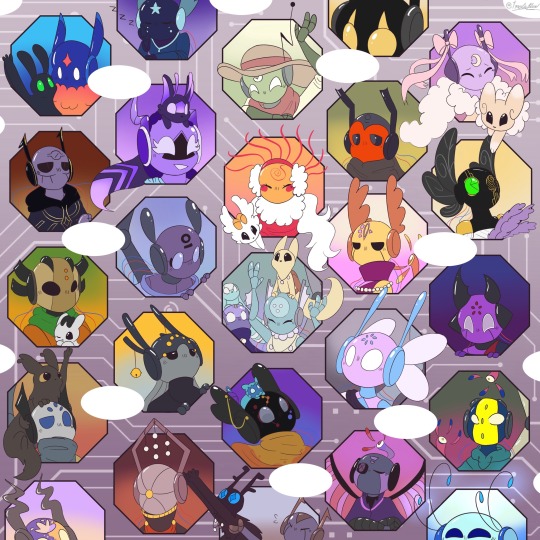
YEAAAAA FIRST EVER MASS ATTACK
I love iterators I am giving them all a little kiss kiss
Character list under the readmore
Column 1
Distant Memories & the Stormchaser @vela-pulsars
Aberration @subconniving
Unbound Thought @gadjetomyart
Flowing Heavens & The Envoy vell_ichor
Blossoming Strelitzia Fields @azrielfiend
Column 2
Lost in Watchful Thought @mothwingedmyths
Kindling Spark & the Welder Callynx
Glittering Oceans @ardienothesieno
Omniscience of Disk jayyykip
Sight through Blindness @altitudeofalcatraz
Column 3
Haybale @sketchywasteland
Nine Linen Lanes & the Transfigurer @pansear-doodles
Sparkling Sea, Meadow In Moonlight, The Aviator, & The Merchant @ask-sparkling-sea aka MEEEEE
Paradox of Creation @skyistheground
Safe Ship, Harbored & The Historian @browzerhistory
Column 4
Beyond the Grasp Theguy
Nine Chimes silvesterhound
Whispering of the Many @altitudeofalcatraz
Fluttering in the Breeze @maplem0th
Several Cheap Fragments @kakyogay
Column 5
Starlight Symphony & the Weaver @mewguca
Timeless Golden Gambit Zirconphyr
Nothing Well-Made @meatcatt
Twelfth Briefly Unbound @arcaedex
Dew that Lingers @reveks
#original character#oc#rain world#rainworld#iterator#rw iterator#iterator oc#rain world iterator#slugcat#rain world slugcat#slugcat oc#indie’s art#other’s ocs#Artfight#artfight 2023
199 notes
·
View notes
Text

after 10000000 bajillion years them once again
(so like earlier I helped friends with the aberrant paradox fight and he put up the fire bubble for allison when she was hitting so she'd look cool in front of everyone trust!!)
26 notes
·
View notes
Text
Something I've been thinking about since watching Godzilla Minus One
SPOILERS UNDER THE READ MORE
I feel like they managed to make this version of Godzilla feel just as much of an aberration as Shin Godzilla but in a much more subtle way.
What particularly stands out to me is how Godzilla's atomic breath would injure his face every time he used it, wounds appearing on his face showing how damaging to his body the radiation built up inside him is. This is mitigated by his regeneration that can heal back any damage done by his own power but I feel like there's an existential horror to that. Like his twisted mutated biology is both trying to kill and and keep him alive at the same time. He's a living paradox that shouldn't exist in this world but continues to anyway.
#godzilla minus one#godzilla minus one spoilers#just some thoughts I slapped together and called a post
83 notes
·
View notes
Text
How is not having a job simultaneously the best and worst thing in the world.
On one hand I feel pure and clean of material filth, and I feel better knowing that Jesus and Buddha were broke as well yet connected to god and happy! I feel happier when doing charity for others than hoarding money for myself. I’m glad I spent my savings in Asia rather than have lost everything to inflation in Canada.
However I’m too broke to get McDonald’s or leave the country so I have to enter the corrupt world of capitalism again. You know how ppl say they feel refreshed after their holidays? It’s true. My life is a mess rn but I’m the happiest I ever was. I regret nothing. But soon I’ll have material wealth and be unhappy again. It’s a weird paradox but the 21th century is an aberration in itself.
90 notes
·
View notes